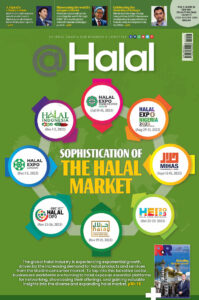
The Qur’an warns Muslims they are not to eat any meat on which any name other than Allah’s has been mentioned

BY Dr Azmi Abd Aziz
INTRODUCTION
Eating halal food is considered an act of worship, which is believed to bring them closer to Allah. It’s also seen as a way of maintaining purity and avoiding sin. In addition, halal food is essential for Muslims because it helps them to fulfil their religious obligations.
The global halal product industry is flourishing, especially in Asian countries. This development has accelerated halal standards, traceability systems, and basic concepts about halal, impacting the increasing demand for halal products, especially food products (Hamid et al., 2019; Khan & Haleem, 2016).
AREA OF CONCERNS TO FOOD PRODUCTS
In the new growing world, it has become highly challenging for Muslims to determine whether the foods or drinks are considered religiously acceptable or halal. The halal or non-halal problem is not only limited to food or drinks but also related to other products or services.
In the halal food industry is regarded as the biggest halal industry due to the customers’ demand for halal food products; indeed, halal food is an essential element for Muslims’ lives.
The Malaysian context, Jabatan Kemajuan Islam Malaysia (JAKIM), did not grant halal accreditation to many hotel restaurants because it was found that these outlets used suspicious items like alcohol in cooking, mixing of halal and non-halal items in the store and raw materials such as meat and chicken were sourced from suspect suppliers.
Protection of Muslim interests through a legal institution will enhance certainty in public. With this regulation, the Indonesian government switched the halal certification regime from voluntary to mandatory (Limenta et al., 2018).
IMPORTANCE OF HALAL

• Under Sharia Law, halal foods are lawful and permitted to be eaten by those observing Islamic teachings. Muslims are not allowed to consume foods or beverages that are haram, or forbidden.
• Malaysia, with its predominantly Muslim population, places great emphasis on adherence to Islamic principles, including dietary laws. Halal, meaning permissible in Arabic, signifies food prepared, processed, and consumed as per Islamic dietary laws, reflecting cultural and religious significance.
Consumers are becoming more aware of their rights and responsibilities and conscious about their food.
Halal certification is also a mark of quality and safety, demonstrating that the product or service has been produced under strict Islamic standards. Halal logo and certification are crucial for consumers because they are considered a sign of quality and safety.
• Halal-certified products demand a high level of hygiene and specific standards of cleanliness, safety, and nutrition that fulfil the needs of consumers, especially Muslim consumers.
• Halal income is a term used to refer to earn.ings or profits obtained through acceptable or permissible means under Islamic law. In Islam, it is considered essential to ensure that one’s income is earned in a morally and ethically correct way.
• Suppose your product is recognised among other products and is already halal-certified. In that case, it is a guarantee that your product is suitable for consumption and is not indicated by things that are prohibited by Islamic law.
BENEFITS OF CONSUMING HALAL MEAT PRODUCTS

The Qur’an warns Muslims that they are not to eat any meat on which any name other than Allah’s has been mentioned. It is presumed to refer to both the slaughtering and cooking process. “If you are forced by necessity, you are allowed to eat just enough to maintain your life”.
Halal animals also can’t be treated with antibiotics or growth hormones since the hormones may contain pork-based ingredients.

There is overwhelming evidence as to why we should include halal meat as part of our diet, regardless of our religious beliefs. The superior taste, ethical considerations, and health benefits give compelling reasons to adopt halal meat into your daily food intake.
CONCLUSION
The rules that make it mandatory for halal food manufacturers to be certified as halal first before offering halal products to consumers is part of the preventive action. Despite no explicit Islamic law indicating the obligation to have the halal certification, there is a need today to ascertain the status of the halalan toyibban food products. –







